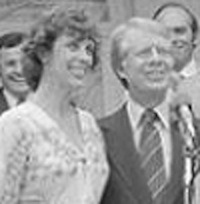Patricia Derian, human rights pioneer: A personal appreciation

Those of us who are very, very lucky have someone in our lives, at some point, who helps set us on a path to discover and fulfill our particular mission in life. For me, that person was Patricia Derian—Patt to those who knew her—who died from Alzheimer’s at the end of May.
I first met Patt in Jackson, Mississippi, when I babysat for her kids in the early 1960s. I was a naïve, idealistic college kid at Millsaps College in Jackson. Patt was a doctor’s wife and mother of three, active in the local civil rights movement that was beginning to rage around us.
Trouble and controversy scared me, but they did not faze Patt. I do not know half of the civil rights issues she took on during those years. I just know she did not stop. From her, I learned that awareness of injustice is not enough; you have to act.
At the time, I had little idea of how to turn my beliefs into action. Patt did. She shocked Jackson society when she dived into issues like public school desegregation. She helped get the city’s first Head Start program on its feet. She fought to integrate the all-powerful, all-white Democratic Party in the state. After the integrated Freedom Democratic Party delegation was turned away at the 1964 Democratic Convention in Atlantic City, a delegation that was half black, half white, half male, and half female was finally seated at the 1968 convention in Chicago. Patt was a leader of that effort, too. I was in awe of her energy and her passion.
I took a few baby steps when I was still an undergraduate. I helped organize students at Millsaps to integrate our college, which was segregated at the time. I went to lectures and took a course at Tougaloo College, a local black college. I discovered a few budding journalistic skills and covered the burnings of black churches for a small progressive newspaper. I got in trouble with my Mississippi family, traditional, conservative Southerners.* Whenever I saw Patt, she heard it all—my insecurities, my discoveries, my growing pains, my eagerness.
After graduating from Millsaps, I moved to New York City. But I stayed in touch with my Mississippi roots … and with Patt. In 1971, I found myself back in Jackson to work on the gubernatorial campaign of Charles Evers, Medgar Evers’ brother and the first black person in the state to run for governor. That summer, Patt and I drove to the Mississippi Delta to attend the funeral of Jo Etha Collier, a teenager who had been gunned down on the sidewalk by a trio of white men just after her high school graduation ceremonies.
I will never forget that day—the sadness of this teenager’s loathsome murder and her funeral, of course—but also the gift of time in the car with Patt. After the funeral, we went the Ruleville home of Fannie Lou Hamer. Hamer, a brilliant civil rights organizer, speaker, and tactician, spoke at Collier’s funeral that day. Civil rights leaders were my rock stars, and Hamer was at the top of my list.
Patt’s organizing spirit continued to guide me when I returned to New York that summer. She introduced me to Gloria Steinem at a time when my civil rights instincts were merging with a burgeoning feminist commitment, and I embarked on a career in journalism and advocacy that continues to this day.
Fittingly, Patt’s career went international when President Jimmy Carter appointed her to the state department with a portfolio of human rights. She took that issue and ran with it as only she could, redefining American diplomacy in the interest of humanitarian rights and confronting a bunch of despots along the way. This did not surprise me at all, because whatever stage she was on, she was steadfast about acting on her beliefs and remained the same committed leader she was when we first met in Jackson, Mississippi in the 1960s.
I never completely lost touch with Patt, but did not see her often after the 1980s. I never got to tell her how much she meant to me, especially when I was a young wannabe activist in Mississippi. Or how she continued to inspire me as I grew up and my career moved from Ms. Magazine to philanthropy to freelance consulting and writing about issues I care most about. A year ago, I sensed all was not right and wrote her a letter. Her husband, Hodding Carter, a native Mississippian equally dedicated to issues of justice, called to tell me she was far into Alzheimer’s disease. He read my letter to her. I want to believe she took it in.
For years, wherever I worked, I pinned a quote from Patt on my office bulletin board. In talking to a reporter about what it was like to be a white Mississippi housewife with three kids in a society polarized by racism, Patt said: “All of a sudden, there you were. You had to decide if you were going to live up to your principles—or accept that you didn’t have any at all.” This simple statement explains her life, what she offered to me, and I’m sure what she offered to many others. Thank you, Patt.
*It seems benign now, but in 1964, Joan Baez gave a concert at Tougaloo and a number of Millsaps students went. Many of the kids who attended weren’t especially politically involved—it was Joan Baez, after all—but at that time, it was an act of defiance just to set foot on the Tougaloo campus. Someone at the concert that night made a list of all the white people who attended and distributed it throughout Jackson for our families to see. It was a sick form of intimidation.
More articles by Category: Disability, WMC Loreen Arbus Journalism Program
More articles by Tag:



























